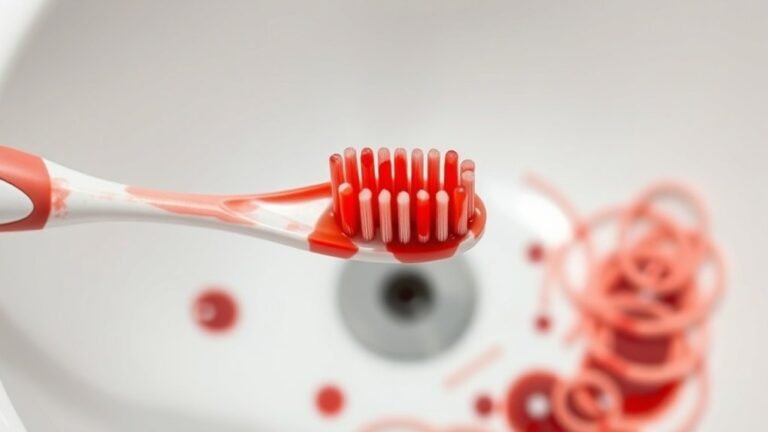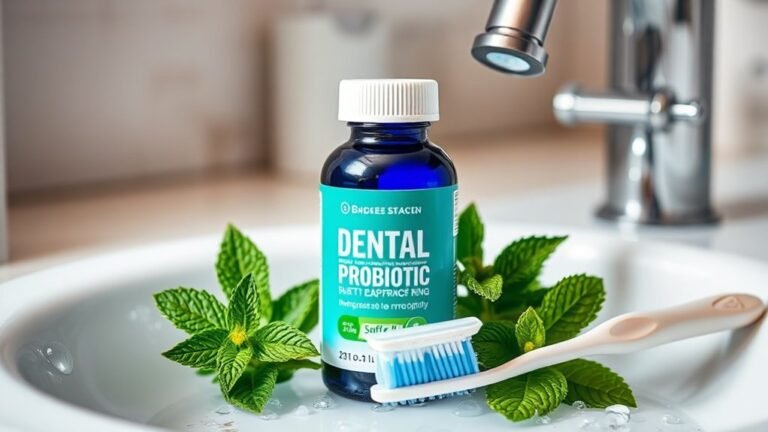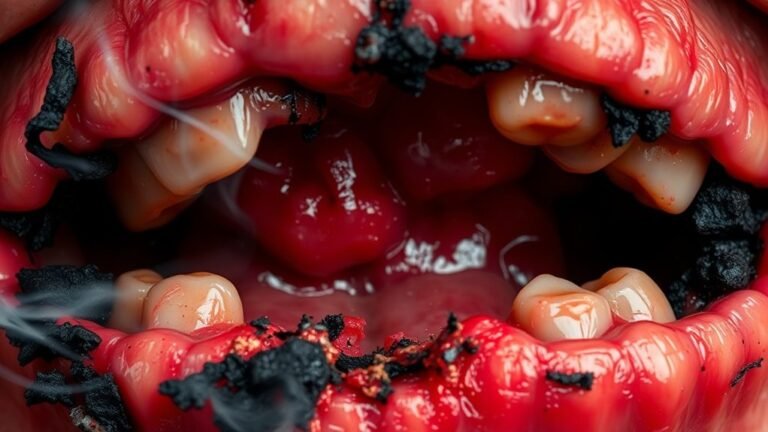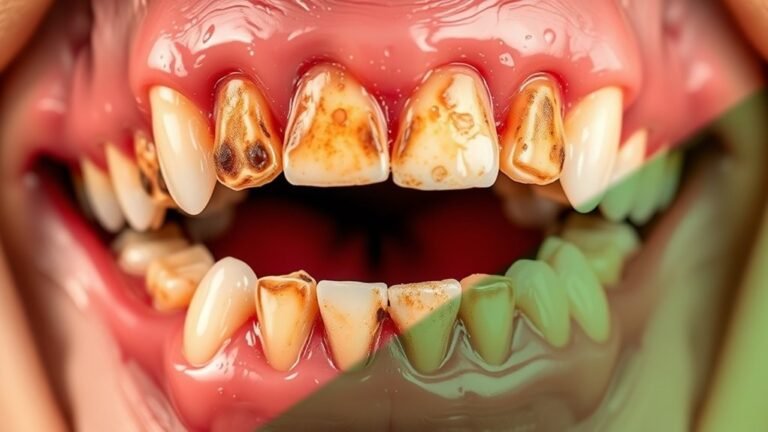How Does Gingivitis Cause Gum Pain and What You Can Do at Home
Gingivitis causes gum pain due to inflammation from plaque buildup, leading to swelling and irritation. You might notice red, bleeding gums when brushing or flossing, which can be uncomfortable. At home, you can alleviate this pain by rinsing with warm salt water, using a cold compress, or applying clove oil to the affected area. Maintaining a consistent dental care routine is vital. There are also additional steps you can take to support your gum health and prevent further issues.
Key Takeaways
- Gingivitis causes gum pain due to inflammation, leading to redness, swelling, and sensitivity in the gums.
- Accumulation of plaque and tartar irritates the gums, resulting in bleeding during brushing or flossing.
- Home remedies like warm salt water rinses can help reduce inflammation and alleviate gum pain.
- Applying a cold compress provides numbing relief from discomfort associated with gum irritation.
- Maintaining a consistent oral care routine and a diet rich in vitamins supports overall gum health and prevents further pain.
Understanding Gingivitis and Its Causes
Gingivitis is an inflammation of the gums that often serves as the first sign of gum disease. It’s primarily caused by the accumulation of plaque, a sticky film of bacteria that forms on your teeth. If you neglect your dental hygiene, this plaque can harden into tartar, exacerbating gum inflammation. You might notice symptoms like bleeding gums, especially when brushing or flossing. Factors such as smoking, hormonal changes, and certain medical conditions can also increase your risk of developing gingivitis. To prevent this condition, maintain a consistent dental hygiene routine, including regular brushing and flossing. By addressing gingivitis early, you can protect your gums and overall oral health, preventing further complications down the line.
Symptoms of Gingivitis and Gum Pain
When you experience gingivitis, you’ll likely notice some common symptoms that indicate inflammation of the gums. These can include redness, swelling, and bleeding during brushing or flossing. Understanding these signs of gum pain is essential for prompt treatment and maintaining oral health.
Common Gingivitis Symptoms
Healthy gums are essential for overall oral health, and recognizing the common symptoms of gingivitis can help you address issues early. You might experience gum pain or discomfort, which often accompanies gum irritation. Pay attention to any signs of gingival bleeding, especially when you brush or floss your teeth. This bleeding is a key indicator of inflammation in your gums. Additionally, you may notice increased gum sensitivity, making it uncomfortable to eat certain foods or maintain your oral hygiene routine. If you observe these symptoms, it’s vital to take action promptly. Ignoring them can lead to more severe oral health issues, so consider adopting better dental hygiene practices and consulting a dental professional for tailored advice.
Understanding Gum Pain
Gum pain often signals underlying issues, and recognizing its connection to gingivitis can help you manage your oral health effectively. Symptoms like gum swelling and sensitive gums are common indicators of inflammation within your oral microbiome. Understanding these symptoms can guide you in addressing gingivitis promptly.
| Symptom | Description | Action |
|---|---|---|
| Gum Swelling | Enlarged, puffy gums | Improve oral hygiene |
| Sensitive Gums | Discomfort when touched | Use gentle toothbrushes |
| Inflammation | Redness and irritation | Rinse with salt water |
The Connection Between Plaque Buildup and Gum Health
As plaque accumulates on your teeth, it can lead to serious consequences for your gum health. This sticky film, if not removed through regular brushing and flossing, hardens into tartar, irritating your gum tissue. Over time, this irritation can progress to gingivitis, the earliest stage of periodontal disease. You might notice symptoms like swelling, redness, and bleeding gums during this phase. A consistent oral care routine is essential in preventing plaque buildup and maintaining healthy gums. Incorporate daily brushing, flossing, and regular dental check-ups to keep plaque at bay. Remember, neglecting your gum health can lead to more severe issues, including tooth loss. Prioritizing your oral hygiene will help protect your gums and overall dental health.
Home Remedies to Alleviate Gum Pain
When you experience gum pain, turning to home remedies can provide relief and help manage discomfort effectively. Rinsing your mouth with warm salt water can reduce inflammation and promote oral health. You might also consider applying a cold compress to the outside of your cheek for numbing relief. Herbal supplements like clove oil possess natural analgesic properties and can be applied directly to the affected area. Maintaining consistent dental care, including gentle brushing and flossing, is essential to prevent further aggravation from gum infection. Additionally, staying hydrated and consuming foods rich in vitamins C and D supports gum health. These simple strategies can alleviate pain and contribute to your overall oral health.
Preventive Measures for Maintaining Healthy Gums
To maintain healthy gums, it’s essential to adopt a proactive oral care routine. Regular habits can effectively prevent the buildup of tartar and combat gum disease. Here are some preventive measures to keep in mind:
Adopting a proactive oral care routine is essential for maintaining healthy gums and preventing gum disease.
- Incorporate oral probiotics into your daily routine to promote beneficial bacteria that support gum health.
- Maintain a balanced diet rich in vitamins and minerals, particularly calcium and vitamin C, to strengthen your gums and tissues.
- Schedule regular dental checkups to catch any potential issues early and receive professional cleanings that remove tartar buildup.
When to Seek Professional Dental Care
How can you tell if it’s time to seek professional dental care for gum issues? If you notice persistent gum pain, swelling, or bleeding, don’t wait. These symptoms often indicate that bacteria have triggered an immune response, leading to inflammation of the gingiva. When home remedies fail to alleviate these symptoms, it’s essential to consult a dentist. Additionally, if you experience bad breath or your gums appear to be receding, these may signal more severe gum disease requiring expert intervention. Timely professional care not only aids in gum healing but also prevents potential complications like tooth loss. Remember, addressing issues early can save you from more extensive treatments down the line. Don’t hesitate to reach out for help.
Frequently Asked Questions
Can Stress Contribute to the Development of Gingivitis?
Yes, stress can contribute to gingivitis development. It weakens your immune system, making it harder for your body to fight off infections, including gum disease. Managing stress is essential for maintaining good oral health.
Is Gingivitis Reversible Without Professional Treatment?
Yes, gingivitis is often reversible without professional treatment. By maintaining good oral hygiene, like regular brushing and flossing, and using mouthwash, you can reduce inflammation and promote gum health effectively at home.
Can Certain Foods Worsen Gum Pain?
Yes, certain foods can worsen gum pain. Spicy, acidic, or hard foods may irritate your gums, increasing discomfort. It’s best to avoid these while you manage inflammation and promote healing through a balanced, gentle diet.
How Often Should I Brush to Prevent Gingivitis?
Brush your teeth twice a day, like clockwork, to keep gingivitis at bay. Consistency’s your ally in maintaining gum health. Don’t forget to floss daily; it’s the secret weapon against plaque buildup and inflammation.
Does Smoking Affect Gum Health and Pain?
Yes, smoking negatively impacts gum health, increasing inflammation and susceptibility to infections. It reduces blood flow, making healing slower, which can lead to more pain. Quitting smoking can greatly improve your gum health and overall oral condition.
Conclusion
In summary, managing gingivitis at home is essential for maintaining your gum health and preventing discomfort. By adopting effective remedies and preventative measures, you can keep your smile as bright as a thousand suns. Remember, if your symptoms persist or worsen, don’t hesitate to seek professional dental care. Your gums deserve the best treatment possible, and with the right approach, you can guarantee they stay healthy and pain-free for years to come.






